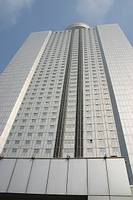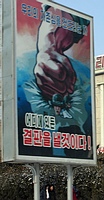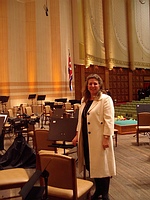Beautiful Music from North Korea
The buses were waiting outside Peninsula Hotel in Beijing, China at 8:30 on a chilly February morning last winter, clouds of exhaust hanging in the dirty air, ready to carry the musicians of the New York Philharmonic orchestra and hundreds of others, including press, patrons, and support staff, to the airport to catch a flight to one of the most mysterious and closed societies on Earth today—the Democratic People’s Republic of Korea (DPRK).
A separate convoy of 15 trucks and 110 people was waiting at the gates of the DMZ to pass through the forbidden zone on the ground and drive north to Pyongyang, North Korea. Loaded onto them was every scrap of equipment and supplies, including fuel for the round trip, that the orchestra would need to put on its historic live broadcast from Pyongyang on February 26. It was an old-fashioned Cold War break-through, via a cultural exchange, such as we haven’t seen since American ping pong players went to China in 1971.
How did all of these hundreds of people get organized to embark on this adventure? Only a few months before, in December, the New York Philharmonic had hired Palisadian Michele Balm as its production consultant for North Korea. Jumping in at what was essentially the last minute, she embarked on a whirlwind organizational effort oversee all the logistics for the trip, which was added on to the orchestra’s already-organized Asian tour due to diplomatic arrangements made during the Six-party talks for nuclear disarmament of North Korea throughout the summer and fall of 2007.
Although an advance group from the orchestra had visited DPRK in October to assess if a trip was even feasible, most of the arrangements could only be started when high-level diplomatic arrangements were finally secured in December. Michele’s pre-trip duties including flying to Beijing with a “frightening” amount of cold cash in her pocket to the only visa office in the world that the DPRK has authorized to issue visas, and ensuring that every one of the 350 travelers had all their paperwork in order. Then during the trip, she organized all the schedules and transportation for three different groups of travelers—the orchestra, the press, and 25 lucky New York Philharmonic patrons, who had helped to underwrite the cost of the trip.
The flight between Beijing and Pyongyang had to fly a roundabout route to stay over water, and was donated by Asiana Airlines. And thus began an exhausting four-day adventure; Michele estimates that she got about 7 hours of sleep total during the trip.
The Philharmonic entourage disembarked directly onto the tarmac at the Pyongyang Airport, with the press getting off first so that the arrival could be documented. All their passports were promptly confiscated by the phalanx of DPRK security agents, that were all, in a strange North Korean twist, extremely beautiful young women. All press documents would be held until departure, along with everyone’s cell phones. The group had no freedom to go anywhere on their own during the trip, as the tight schedule kept everyone on a bus or at an event throughout. In addition, 350 “minders’ were assigned to follow each foreign visitor, just in case anyone had any wild ideas about doing something unauthorized.
Michele’s minder was named Mr. Ri. He was assigned to sleep in a room on the same floor of her hotel, and was quite friendly–in one conversation, he confided in her that he owned a cocker spaniel, and that he was quite a dog fancier. Mr. Ri found that he could not easily keep up with her hectic responsibilities, and he was often inadvertently left behind. He only gradually realized that she was so busy because she had an important administrative position. In fact, when she told him that her husband was back at home looking after her children, he was dumbfounded, and inquired if she was “the number one person in her family and husband is number two?” “We’re both number one,” Michele explained. Mr. Ri looked very pensive while he processed that information.
The hotel where they stayed was 47 stories high, and had a revolving restaurant on top. But, in one of the strange paradoxes of North Korean living, the hotel was not heated except at the special request in the rooms of the foreign visitors, where the temperature was somewhere around 86 degrees. Unfortunately, the windows were sealed shut and Michele had to sleep in front of the mini-fridge with the door open. Most other buildings they visited were also unheated, although there was snow on the ground and it was the dead of winter.
Most of what the visitors saw of daily life in North Korea was restricted to what could be glimpsed through the bus windows. The nearly empty city streets had no traffic lights; instead, beautiful young women in snappy outfits with fur collars stood at all the major intersections to direct traffic on a car by car basis. Most of the fiercely anti-American posters showing a huge green fist crushing an American G.I. into a broken map of the United States had been removed since the advance orchestra group had visited in October, but Michele spotted one left over and was able to get a photograph of it.
Even after the group had departed, the strangeness of North Korea followed them. On the plane flying back to Beijing, she mentioned to her seatmate that her minder had had a cocker spaniel. Within a few minutes, as the passengers throughout the plane compared notes, a curious coincidence emerged—every single minder had owned a cocker spaniel!
Michele did most of her advance logistical preparations through a single contact from the North Korean government, its UN liaison, Counselor Pak, in New York City. All e-mail was addressed to him, and all responses from different parties in his country came back through him. Fortunately, he proved to be effective and easy to work with, and was, in fact, charming and sophisticated, with a puckish sense of humor. In Michele’s opinion, his role was central to the whole event, which probably could not have been organized without his competent diligence.
Everything went off without a hitch. The concert was a huge success, and a peaceful link between the North Korean people and the West was established on neutral ground that everyone could appreciate—beautiful music. Michele didn’t actually see the concert, as she was too busy with her job responsibilities. but if, like her, you missed it too, you can still catch it on the orchestra’s website at nyphil.org or you can purchase the DVD that was made of the event.










